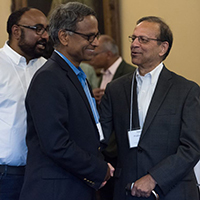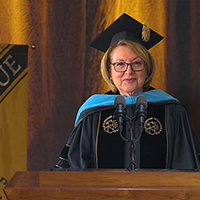Beginning the life of a faculty member: First stop — Ohio State University
 When I joined OSU, there were already a couple of professors in the accounting department who had been teaching IS courses, but they were trained as accountants. Thus, I was their first true hire in IS. Everyone was nice to me and tried to make me feel at home. The course I was assigned to teach was a different matter, though. It was an accounting information systems course. I had some knowledge about parts of the course and practically none about the other parts. Fortunately, one of those other professors was teaching one section of the course at 8 am, and my first section was at noon on the same days of the week. With his permission, I sat in his class and tried to absorb the material as much as I could. Little did I know that some students found out this arrangement. When I looked through my course evaluations at the end of the term, I noticed the following comment in one student’s evaluation: “This guy must be smart. He learns the material himself at 8 and teaches us at 12.” His assumption about my learning was perhaps not so accurate, however, as evident from the following incident: In the last class of the term, as one my parting remarks, I said, “Hope you will get a better instructor in the next term.” A student promptly raised her hand and said sympathetically, “Don’t say that. Considering how little you know, you did a good job.”
When I joined OSU, there were already a couple of professors in the accounting department who had been teaching IS courses, but they were trained as accountants. Thus, I was their first true hire in IS. Everyone was nice to me and tried to make me feel at home. The course I was assigned to teach was a different matter, though. It was an accounting information systems course. I had some knowledge about parts of the course and practically none about the other parts. Fortunately, one of those other professors was teaching one section of the course at 8 am, and my first section was at noon on the same days of the week. With his permission, I sat in his class and tried to absorb the material as much as I could. Little did I know that some students found out this arrangement. When I looked through my course evaluations at the end of the term, I noticed the following comment in one student’s evaluation: “This guy must be smart. He learns the material himself at 8 and teaches us at 12.” His assumption about my learning was perhaps not so accurate, however, as evident from the following incident: In the last class of the term, as one my parting remarks, I said, “Hope you will get a better instructor in the next term.” A student promptly raised her hand and said sympathetically, “Don’t say that. Considering how little you know, you did a good job.”
Gradually, I got settled at OSU. In my third year, the department got the approval to recruit two more IS professors, and I was given the primary responsibility to recruit them. We were successful in filling both positions with two promising young faculty. One of them was Hasan Pirkul, who was promoted to professor in due course, joined University of Texas at Dallas as dean of its business school a few years later, and has turned out to be a very successful dean. Interestingly, the vice dean at UTD, Varghese Jacob, also began his career at OSU a few years after Hasan.
During my fourth-year evaluation, the department unanimously voted to promote me to associate professor with tenure, two years earlier than usual (at OSU, the candidate was notified of the exact vote count at that time). The college promotion and tenure committee as well as the dean supported this decision, but the provost turned it down saying that a decision of such importance should be made based on one’s performance in a long-distance run, not in a sprint. I was disappointed, and not being a runner, did not quite appreciate the running analogy either. Anyway, I was promoted and tenured in the following year. However, I had already accepted an offer to visit Cornell University for a year to start with. I went to Ithaca, NY, enjoyed the year checking out Cornell’s beautiful campus and many outstanding departments, but returned to my secure, tenured position at OSU the year after.
A couple of years later, when I was still an associate professor, a smaller private university, University of Dayton, offered me an endowed chair with full professorship and attractive benefits. At that time, unlike it is now, there were very few endowed positions in IS in the country. I was having a hard time deciding whether I should accept this nice offer and move to a smaller university, which had a good reputation in teaching but not so much in research, exept for its semi-independent research institute that mainly conducted externally funded engineering research. Even before I mentioned this offer to anyone in my department at OSU, one person heard about it somewhere and passed it on to the department chair. Apparently, the department chair contacted the dean, who in turn contacted the provost, to determine if I could be considered for promotion to full professor at OSU quickly. To my utter disbelief, the provost — a different person from the one at the time of my tenure — agreed to condense the usual nearly six-month-long promotion procedure to less than three weeks, which was the time left before the deadline of my offer. He also allowed all external reviews to be collected over the phone. While I was overwhelmed by this extremely unusual arrangement and kind gesture, I also felt that if I agreed to this arrangement and got promoted, I would be so obligated that I would never be able to leave OSU to go somewhere else even if I wanted. I came up with the following proposal: Let me go to UD on a leave of absence, consider me for promotion following the normal procedure at the normal time while I am away, and then I will make the final decision. My proposal was accepted, I moved to UD in 1987, and was promoted to full professor at OSU effective in 1988. I still, however, could not make up my mind and asked for an extension of my leave from OSU, which was granted. By the time the extension was over, I was pretty settled at UD, we made a few good hires in IS, and I started a fulfilling and successful research collaboration with two colleagues. After a great deal of pondering, I decided to stay at UD. To date, I remain truly grateful though to my colleagues and the administrators at OSU for their extraordinary cooperation and support.





